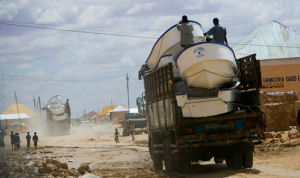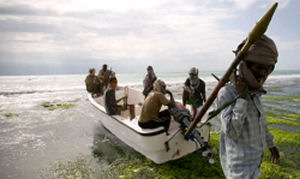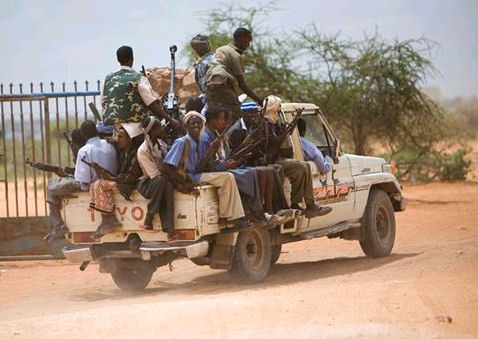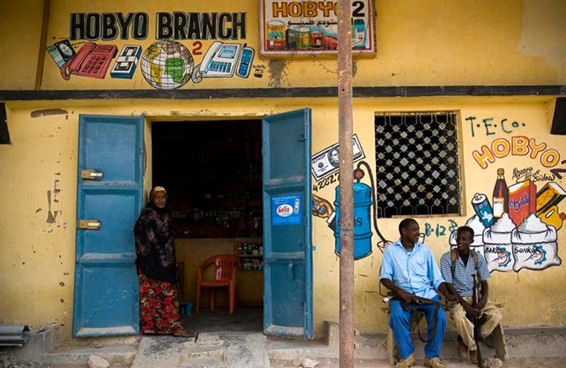Somali Economic Stimulus Package! Boat Sales Soar as Money Pours In
Until last Sunday and the death of
five of their fellow buccaneers, for young Somalis, piracy offered a life of boating
fun, camaraderie, adventure and easy money. Last year Somali boaters took in over
$80 million in ransom money. Their activities have been a bonanza for the local
economy which heretofore had been living on U.S. AID shipments of subsidized grain
and an occasional local goat. These young boaters have been buying grand houses,
luxury cars, and attracting beautiful wives. In the last two weeks they had gotten
a taste of the yachting lifestyle when they hijacked three yachts, one a sailboat
with a crew of four and a 3-year old child aboard, another which was a luxury cruising
catamaran in the Seychelles, and a third yacht with three men aboard sailing to
Madagascar. There are reportedly over 100 of these little, high freeboard pirate
ships currently in use.
  |
|
Each truck is carrying five freshly-made, 21st-Century pirate ships. Boat builders are working overtime to supply the demand as boat buying fever sweeps the Somali coast. |
News reports this past weekend tell us that there are about
1,000 pirates active in Somalia and that they are in league with clan or village
elders who endorse their activities. We discovered the report below from Nairobi
which seemed to offer particular insight into the Somali situation.
Story from the Associated Press filed from Nairobi, Kenya—
Piracy is a lucrative business in Somalia, a country with no central government,
no banks and few merit-based opportunities because of an entrenched clan system.
For Somali men such as those who hijacked an American cargo ship, banditry at sea
offers power and potential prosperity in a land so bleak that life expectancy is
just 46 years and a quarter of children die before they reach 5.
Pirates are attracted by Somalia's lawlessness and its strategic location. The Gulf
of Aden is one of the world's busiest waterways, with 20,000 merchant ships passing
through yearly on their way to and from the Suez Canal. Countless fishing boats
drop anchor in search of tuna, snapper and barracuda, which are plentiful in Somali
waters.
 It’s all part of a self-help job re-training program that has put thousands of people to work. |
The Good Life
"Years ago, our life depended on fishing, but now we have a lot of money. We have
luxury cars, beautiful houses and everything we want in our coastal village," said
Salah Haji Bahdon, who identified himself as a pirate in a phone interview with
The Associated Press from the community of Eyl. The region is where many hijacked
ships are anchored while pirates negotiate ransoms.
Bahdon added, "It is like a small paradise where people are oblivious of the problems
going on in the other corners of Somalia."
Piracy Reviving Local Economy
In 2008, pirates seized 42 vessels off the country's 1,900-mile coastline, the longest
in Africa.
Since January, pirates have staged 66 attacks, and they are still holding 14 ships
and 260 crew members as hostages, according to the International Maritime Bureau,
a watchdog group based in Kuala Lumpur.
A Needed Stimulus Package
Foreign governments have condemned the seafaring robbers, but Somalis say they are
grateful for the growth pirates bring to port towns. Piracy has improved the economy
somewhat around Eyl, in the northern Puntland region. Commerce has increased because
the pirates bring cash to spend. The pirates have promised to build new schools
and better roads, but they have yet to deliver on those projects.
 Abdul Hassan lives in Hobyo, Somalia, a pirates nest. He leads a pirate group that attacked 30 ships last year and grossed $10 million in ransom. |
They Will Soon Join the Rotary
The AP called villagers in Eyl who had provided reliable information in the past,
and they independently verified that Bahdon and two other men were pirates. The
villagers also put an AP reporter in touch with the men. One of the men insisted
his pirate gang was not merely a band of ruffians, but a well-organized, business-minded
group that also had philanthropic concerns.
"We have leaders, investors, young people who go to the sea for hunting ships and
also negotiators in many areas," said the man, who identified himself only as Madobe
and said he was in his 20s.
Money Gets Spread Around
He said pirates also have "very reliable support from the people on the ground."
And, he added, the pirates give a share of their ransom money to local elders, militia
commanders and politicians to curb any threats.
Last year, pirates made off with up to $80 million in ransom money, said Roger Middleton,
a piracy expert at the London-based think-tank Chatham House. Those hauls included
payment for a Saudi oil tanker and a Ukrainian ship loaded with military tanks,
both of which were later released.
 With so much cash around, the local economy has been booming and inflation has set in with some goods costing twice as much as before. |
Hostages Equal Cash
Pirates typically wear fatigues and operate from speedboats equipped with satellite
phones and GPS equipment. They are often armed with automatic weapons, anti-tank
rockets and various types of grenades. But the heavy armaments have not spared them
from failure.
One attempted attack last year fell short when the pirates' ladder was not long
enough to scale the side of a frigate they were trying to board. In March, pirates
mistook a German military supply ship for a commercial ship and launched an attack.
They were chased down and seven pirates were captured by international forces.
 Stay-at-home moms in Bitali, Somalia who rely on Red Cross bags of corn, each of which is supposed to last two families six months. |
There are several known pirate groups in Somalia. One is based in the southern port
town of Kismayo, which is controlled by Islamic insurgents. Another prominent group
is based in the northern Puntland region, and their ties to the insurgency are thought
to be tenuous. Middleton said the main relationship between pirates and the insurgency
is financial, and they see their hostages as only one thing: a source of cash.